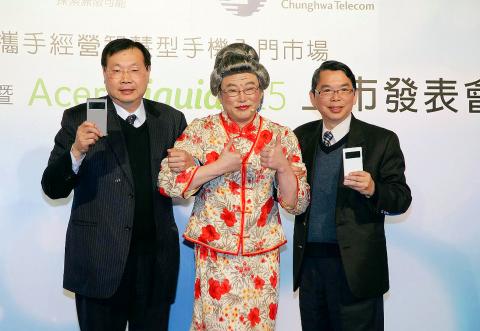Acer Inc (宏碁), the world’s fourth-largest PC maker, yesterday said it plans to launch wearable devices later this year, jumping on the bandwagon of popular mobile devices.
“We actually had demonstrated our products [wearable devices] to some of the company’s clients at the Consumer Electronics Show earlier this month,” said Peter Shieh (謝金全), vice president of Acer’s corporate account business division under the company’s Greater China regional operation department.
“The company is still developing certain types of wearable devices. We certainly aim to play a role in the new market,” he told reporters on the sidelines of a product launch event.

Photo: CNA
He did not said if the wearable products would include smart watches. In collaboration with telecom carrier Chunghwa Telecom Co (中華電信), Acer yesterday launched its new smartphone product, called the Liquid Z5, in Taipei. The new smartphone runs on Google Inc’s Android 4.2 Jelly Bean mobile operating platform and is equipped with MediaTek Inc’s (聯發科) MT 6572 1.3 GHz dual-core processor, a 5-inch display and 5 megapixel camera.
Shieh said Acer also planned to launch smartphones supporting 4G this year to meet consumers’ needs for faster wireless data transmission. He added that Acer will consider collaborating with the nations’ top three telecom carriers — Chunghwa Telecom, Taiwan Mobile Co (台灣大哥大) and Far EasTone Telecommunications Co (遠傳電信) — to help boost sales of its smartphones this year. Acer plans to sell between 140,000 and 175,000 smartphones in the home market this year, Shieh said.
That is between 100 percent and 150 percent more than 70,000 units of smartphones Acer sold in Taiwan last year, he added.
According to Acer’s internal financial report, up to 90 percent of the company’s smartphone sales were generated from telecom carriers’ purchases last year, Shieh said, forecasting that the percentage would remain the same this year.
“Given telecom carriers’ extensive sales channels, Acer has to collaborate with operators to sell its smartphone products in Taiwan and other countries as well,” Fubon Securities Co (富邦證券) analyst Ange Wu (吳淵傑) said by telephone.
Wu said Acer, like its largest domestic rival, Asustek Computer Inc (華碩), can make profits of between 20 and 30 percent of each smartphone’s sales price by selling smartphones to telecom carriers.
However, unlike China’s Lenovo Group (聯想), the world’s biggest PC maker, Acer has to differentiate its products from others and build strong brand loyalty to stay competitive in the smartphone market because “Lenovo has a huge home market that Acer lacks,” Wu said.
Separately, in a filing to the Taiwan Stock Exchange, Acer yesterday said its former chairman and chief executive officer Wang Jeng-tang (王振堂) had resigned from the company’s board of directors before his term was to end in June.

UNCERTAINTIES: Exports surged 34.1% and private investment grew 7.03% to outpace expectations in the first half, although US tariffs could stall momentum The Chung-Hua Institution for Economic Research (CIER, 中華經濟研究院) yesterday raised its GDP growth forecast to 3.05 percent this year on a robust first-half performance, but warned that US tariff threats and external uncertainty could stall momentum in the second half of the year. “The first half proved exceptionally strong, allowing room for optimism,” CIER president Lien Hsien-ming (連賢明) said. “But the growth momentum may slow moving forward due to US tariffs.” The tariff threat poses definite downside risks, although the scale of the impact remains unclear given the unpredictability of US President Donald Trump’s policies, Lien said. Despite the headwinds, Taiwan is likely

When Lika Megreladze was a child, life in her native western Georgian region of Guria revolved around tea. Her mother worked for decades as a scientist at the Soviet Union’s Institute of Tea and Subtropical Crops in the village of Anaseuli, Georgia, perfecting cultivation methods for a Georgian tea industry that supplied the bulk of the vast communist state’s brews. “When I was a child, this was only my mum’s workplace. Only later I realized that it was something big,” she said. Now, the institute lies abandoned. Yellowed papers are strewn around its decaying corridors, and a statue of Soviet founder Vladimir Lenin

UNIFYING OPPOSITION: Numerous companies have registered complaints over the potential levies, bringing together rival automakers in voicing their reservations US President Donald Trump is readying plans for industry-specific tariffs to kick in alongside his country-by-country duties in two weeks, ramping up his push to reshape the US’ standing in the global trading system by penalizing purchases from abroad. Administration officials could release details of Trump’s planned 50 percent duty on copper in the days before they are set to take effect on Friday next week, a person familiar with the matter said. That is the same date Trump’s “reciprocal” levies on products from more than 100 nations are slated to begin. Trump on Tuesday said that he is likely to impose tariffs

READY TO BUY: Shortly after Nvidia announced the approval, Chinese firms scrambled to order the H20 GPUs, which the company must send to the US government for approval Nvidia Corp chief executive officer Jensen Huang (黃仁勳) late on Monday said the technology giant has won approval from US President Donald Trump’s administration to sell its advanced H20 graphics processing units (GPUs) used to develop artificial intelligence (AI) to China. The news came in a company blog post late on Monday and Huang also spoke about the coup on China’s state-run China Global Television Network in remarks shown on X. “The US government has assured Nvidia that licenses will be granted, and Nvidia hopes to start deliveries soon,” the post said. “Today, I’m announcing that the US government has approved for us